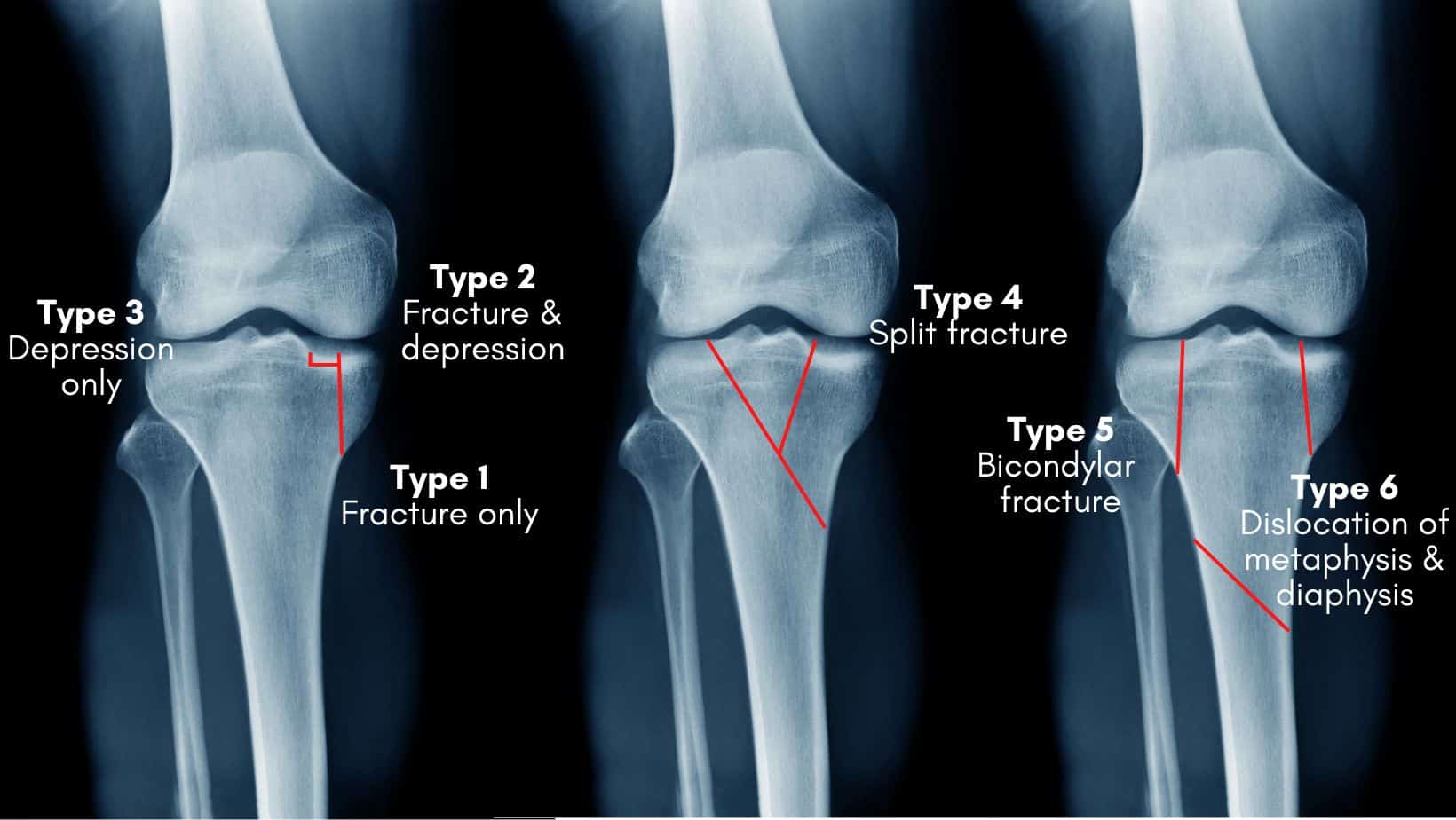Tibial Plateau Fracture Causes, Symptoms, and Treatment
Tibial plateau fractures are intricate injuries that can significantly impact one’s quality of life. In this comprehensive guide, we will delve into the world of tibial plateau fractures, providing you with a thorough understanding of their causes, symptoms, diagnosis, and treatment options.
What Is a Tibial Plateau Fracture?
Breaking Down the Basics: Tibial Plateau Fracture Explained
Before we dive deeper into tibial plateau fractures, it’s essential to grasp the fundamentals. A tibial plateau fracture involves a break in the upper surface of the shinbone, affecting the knee joint. Let’s explore the mechanics of this injury, its anatomy, and why it matters.

Causes and Risk Factors
Unraveling the Triggers: Causes of Tibial Plateau Fractures
Tibial plateau fractures don’t happen in isolation; they often result from specific causes and risk factors. Understanding what leads to these injuries is the first step in preventing and effectively managing them. Join us as we unravel the triggers behind tibial plateau fractures and identify who’s most susceptible.
Symptoms and Diagnosis
Decoding the Pain: Common Symptoms of Tibial Plateau Fracture
Identifying a tibial plateau fracture often begins with recognizing its telltale signs. In this section, we’ll decode the pain by exploring the most common symptoms associated with this injury. Understanding these symptoms is crucial for early diagnosis and prompt treatment.
Types of Tibial Plateau Fractures
Beyond the Surface: Exploring Different Types of Tibial Plateau Fractures
Tibial plateau fractures come in various forms, each with its unique characteristics and treatment approaches. By delving into the different types of tibial plateau fractures, we aim to provide you with a comprehensive understanding of the intricacies involved in these injuries.
Treatment Options
The Road to Recovery: Tibial Plateau Fracture Treatment Choices
Treating a tibial plateau fracture requires a tailored approach based on factors like the fracture type and the patient’s overall health. In this section, we’ll embark on the road to recovery by exploring the treatment options available, both surgical and non-surgical, to help you make informed decisions about your healing journey.
Rehabilitation and Recovery
Bouncing Back Stronger: Rehabilitation After Tibial Plateau Fracture
After undergoing treatment for a tibial plateau fracture, the journey to recovery begins. This section delves into the rehabilitation process, outlining the steps and exercises that can help you regain strength and mobility, ultimately allowing you to bounce back stronger than ever.
Complications and Long-Term Effects
Beyond the Fracture: Potential Complications and Long-Term Impact
While tibial plateau fractures can be treated successfully, they may come with complications and long-term effects. It’s essential to be aware of these potential issues and how to manage them effectively to safeguard your future well-being.
Prevention and Injury Management
Protecting Your Knees: Strategies for Preventing Tibial Plateau Fractures
Prevention is often the best medicine. In this section, we’ll explore strategies to protect your knees and reduce the risk of tibial plateau fractures. Whether you’re an athlete or simply concerned about your knee health, these proactive measures can make a significant difference.
Living with Tibial Plateau Fracture
Life After a Fracture: Coping and Thriving with Tibial Plateau Injuries
Living with a tibial plateau fracture can be challenging, but it’s also an opportunity for growth and resilience. This section explores the emotional and practical aspects of coping with such an injury and offers insights on how to thrive during the recovery process.
FAQs About Tibial Plateau Fractures
1. What is a tibial plateau fracture, and how does it occur?
A tibial plateau fracture is a break in the upper surface of the shinbone (tibia), often resulting from traumatic events like falls, sports injuries, or car accidents.
2. What are the common symptoms of a tibial plateau fracture?
Symptoms may include pain, swelling, inability to bear weight, knee instability, and sometimes deformity. These can vary depending on the severity of the fracture.
3. How is a tibial plateau fracture diagnosed by a medical professional?
Diagnosis typically involves a physical examination, imaging tests (X-rays, CT scans, or MRI), and sometimes, a joint aspiration to rule out other issues.
4. What are the treatment options for tibial plateau fractures?
Treatment can be non-surgical (casting, bracing) for stable fractures or surgical (internal fixation) for displaced or unstable fractures. The choice depends on the fracture’s type and severity.
5. How long does the recovery process take after a tibial plateau fracture?
Recovery duration varies but may range from a few months to over a year, depending on the fracture’s complexity and the chosen treatment method.
6. Are there potential complications associated with tibial plateau fractures?
Yes, complications can include knee stiffness, post-traumatic arthritis, and infections. Early diagnosis and proper treatment can minimize these risks.
7. Can tibial plateau fractures be prevented?
While accidents are not entirely preventable, wearing appropriate protective gear during sports and taking precautions in high-risk situations can reduce the risk of fractures.
8. Is physical therapy necessary after a tibial plateau fracture?
Yes, physical therapy is often recommended to help regain strength, flexibility, and range of motion in the knee joint after a tibial plateau fracture.
9. Can one return to sports or physical activities after a tibial plateau fracture?
Returning to sports or activities depends on the severity of the fracture, treatment outcomes, and guidance from a medical professional. It’s possible with appropriate rehabilitation.
10. Where can I find additional information and support for tibial plateau fractures?
You can seek more information and support from orthopedic specialists, physical therapists, and reliable medical websites. Consult your healthcare provider for personalized guidance.
Conclusion:
As we wrap up our comprehensive guide on tibial plateau fractures, it’s essential to reflect on the journey we’ve undertaken. We’ll summarize key insights, reiterate the importance of early diagnosis and proper treatment, and offer encouragement to those on the path to healing.




